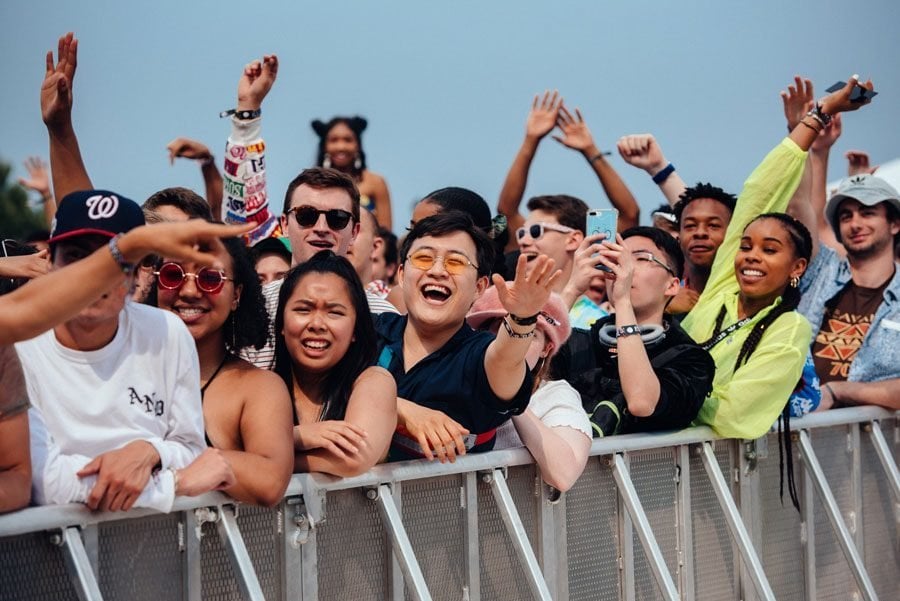The history of Dillo Day: How the 50-year-long tradition came about
Daily file photo by Noah Frick-Alofs
For Members Only first co-hosted Dillo Day with Mayfest Productions in 2019.
May 19, 2022
In 1973, two Texan Northwestern undergraduates founded Armadillo Productions and threw a small gathering. Those humble beginnings kickstarted NU’s beloved Dillo Day festival, now the largest student-run music festival in the nation.
Dillo Day is a day-long music festival run and organized by Mayfest Productions and will celebrate its 50th anniversary Saturday.
Communication senior Conor Metz, co-director of promotions for Mayfest, said he is excited because this year will be the first in-person Dillo Day since 2019.
“It’s a lot of work, but the work is really rewarding, especially as we get to this time of year,” Metz said. “It’s just super exciting to see the student body come together and enjoy what we’ve been working on for months.”
Throughout the school year, students in Mayfest Productions plan bookings, marketing, production and more on 10 committees and subcommittees. They also host programming events leading up to the festival, like Battle of the Artists.
Communication senior Nicole Tank, co-director of promotions for Mayfest Productions, said working with the organization has helped her realize she wants to go into marketing and promotion.
“It seems kind of crazy at times, explaining to people the work that we do,” Tank said. “But it’s an incredible experience you can’t really get anywhere else. Being able to work with Mayfest was how I figured out what I want to dedicate the rest of my life to.”
What really started Dillo?
The campus tradition of Dillo Day began loosely as a counterculture reaction to political and social shifts in the 1970s, and even the origins of the celebration itself have an uncertain history.
The most commonly held origin story comes from friends Donald Stout (Weinberg ’73) and George Krause (Weinberg ’73). Stout said in Northwestern Magazine that he and Krause co-founded the event and named it Armadillo Day in honor of the Texas state animal and after a concert venue in Austin, Texas.
The first Armadillo Day was held May 13, 1973 and was called “The First Annual ‘I Don’t Think We’re In Kansas Anymore’ Festival and Fair,’” according to Stout.
Stout said they created the festival and organization as an alternative to a set of spring events that catered more to Greek life.
“Remember ― this was at the height of the counterculture era and this was definitely oriented to that very large segment of the student body,” Stout said in documents found in the University Archives.
Stout said the event’s main organizers and volunteers were members of Pi Kappa Alpha and other students, but the event was not funded by or affiliated with the Interfraternity Council, according to the archives.
An alternative origin story claims Dillo Day started two years earlier in May 1971. This version says Greek life members held a party with illegal beer kegs without telling administration beforehand, which inspired future festivities on campus.
According to the University Archives, Mayfest began in 1977 as a combination of several spring events including Greek Week, Armadillo Day and A&O Productions’ Spring Festival. Dillo Day now serves as a mashup of these events, providing music, art, food and more for students.
The first Mayfest concert
Steve Jarvis (Communication ’81) said before 1981, Dillo Day was a small celebration at the end of the school year. Jarvis served as the concert chair for A&O during his senior year and said a budget surplus created the tradition of hosting a free concert at the end of Spring Quarter. The production team saw a massive turnout of undergraduates because there was no entrance fee.
“It was huge,” Jarvis said. “Everybody came out, everybody showed up. The weather was great. It stuck and people thought, ‘Why don’t we keep doing this?’”
Jarvis said the stage was set up directly outside the Norris University Center, and the festival lasted for two days, with Robert Gordon and Muddy Waters headlining the event in 1981.
Matt Crawford (Weinberg ’91) said during his time as a student, Dillo Day weekend was in full swing as a NU tradition.
“It was just an opportunity to hang out and have fun,” Crawford said. “You could kind of count on it being a sort of weekend of activity. You sort of forget about classes and stuff like that and just hang out and have fun.”
Dillo Second Stage
Starting in 2019, For Members Only began organizing Dillo Day’s Second Stage, previously organized by WNUR. The Second stage featured more artists in addition to the main stage performers.
Weinberg junior Mychael Torres, FMO’s vice coordinator of external relationships and partnerships, said the organization helps highlight and feature Black artists on the Second stage.
“A lot of the students at Northwestern aren’t already engaging with these smaller Black artists,” Torres said. “Second Stage and FMO have the opportunity of introducing our campus to a lot of new artists and really great artists that they might not have otherwise listened to.”
Tickets for Dillo Day on Saturday are free for undergraduate students, $15 for undergraduate student guests and $25 for Northwestern alumni and graduate students. Tickets can be reserved through the Norris Box Office’s website and can be picked up at Norris.
Email: selenakuznikov2025@u.northwestern.edu
Twitter: @selenakuznikov
Related Stories:
—Northwestern and Evanston officials share updates on COVID-19 and Dillo Day
— Mayfest announces FMO Second Stage Student Artists for 50th Dillo Day
— Mayfest hosts Battle of the Artists, provides platforms to student performers



